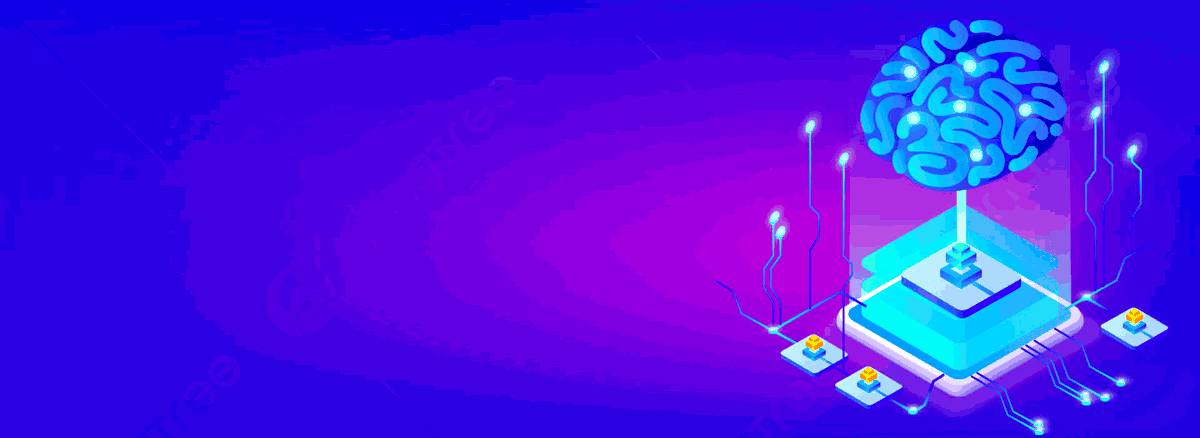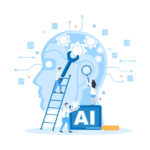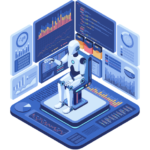
What skills does an AI developer need: Cultivate a powerful toolkit of expertise to conquer AI challenges and excel in the industry.
Let’s explore the essential abilities that drive success.
Programming Languages
Key takeaway: Mastering programming languages is crucial.
One significant aspect of AI development involves writing code. Thus, mastering at least one programming language is essential. Some popular programming languages for AI developers include:
- Python: It’s the go-to language for AI and ML projects due to its simplicity, readability, and robust libraries (e.g., TensorFlow and PyTorch).
- R: It’s a popular language for statistical analysis and data manipulation, crucial in AI development.
- Java: Java’s platform independence and versatility make it another excellent choice for AI developers.
Exemplify: When working on an AI project, you might use Python to build a neural network or R to analyze data.
Pro tip: Start by learning Python, the most popular language for AI development, with many online resources.
Mathematics and Statistics
Key takeaway: Solid foundation in math and statistics is vital for AI developers.
You’ll often work with complex algorithms and data as an AI developer. A strong understanding of mathematics and statistics is essential for grasping these concepts. Some areas of math that are particularly relevant include:
- Linear algebra is essential for working with matrices and vectors, commonly used in ML algorithms.
- Calculus: Required to understand optimization techniques and gradient descent, which are integral to AI development.
- Probability and statistics: Crucial for building and evaluating ML models, understanding data distributions, and working with uncertainty.
Exemplify: When training a neural network, you might use calculus to optimize the model’s weights and biases.
Pro tip: Refresh your math and statistics knowledge with online courses and tutorials tailored explicitly for AI and ML.
Machine Learning and Deep Learning
Key takeaway: Acquiring expertise in ML and DL techniques is a must for AI developers.
To create intelligent systems, AI developers must be well-versed in various machine learning (ML) and deep learning (DL) techniques. These techniques include:
- Supervised learning: Training a model using labeled data, such as regression and classification problems.
- Unsupervised learning: Identifying patterns in unlabeled data, such as clustering and dimensionality reduction.
- Reinforcement learning: Training an agent to make decisions based on rewards and punishments.
Exemplify: You might use supervised learning to train a model that predicts house prices based on historical data.
Pro tip: Gain hands-on experience with ML and DL by working on real-world projects and using popular frameworks like TensorFlow and PyTorch.
Data Wrangling and Preprocessing
Key takeaway: Handling and preprocessing data are vital skills for AI developers.
Data is the lifeblood of AI development, and AI developers must be proficient in managing, cleaning, and preprocessing data. This includes:
- Data extraction: Retrieving data from various sources, such as databases, APIs, or web scraping.
- Data cleaning: Handling missing, inconsistent, or duplicate data to ensure its quality.
- Feature engineering: Machine learning models can be built from raw data.
Exemplify: You might use data wrangling to preprocess text data for sentiment
analysis by removing stop words, stemming, and tokenizing the text.
Pro tip: Familiarize yourself with data manipulation libraries like Pandas in Python and dplyr in R to streamline data wrangling tasks.
Model Evaluation and Validation
Key takeaway: Evaluating and validating models is crucial for building effective AI solutions.
AI developers must know how to assess the performance of their models and validate their predictions. This involves:
- Performance metrics: Select appropriate evaluation metrics, such as accuracy, precision, recall, F1 score, and mean squared error.
- Cross-validation: Using k-fold cross-validation to estimate model performance and avoid overfitting.
- Hyperparameter tuning: Optimizing model parameters to achieve the best performance.
Exemplify: When evaluating a classification model, you might use precision and recall to assess its performance on imbalanced data.
Pro tip: Implement evaluation and validation techniques using ML libraries like sci-kit-learn.
Domain Knowledge
Key takeaway: Domain expertise enhances an AI developer’s ability to create impactful solutions.
While technical skills are critical, having domain knowledge in the area you’re working in can give you an edge. AI developers can create more targeted, practical solutions by understanding a domain’s context and specific challenges.
Exemplify: An AI developer with expertise in healthcare might develop a more accurate medical diagnosis system by incorporating their knowledge of symptoms and conditions.
Pro tip: Collaborate with domain experts and stay informed about the latest developments in your area of interest.
Soft Skills
Key takeaway: Soft skills are essential for AI developers to succeed in the workplace.
AI developers must possess various soft skills to communicate, collaborate, and problem-solve effectively. Some critical soft skills include:
- Communication: Clearly explaining complex AI concepts to non-technical stakeholders and team members.
- Teamwork: Collaborating with cross-functional teams, including data scientists, engineers, and product managers.
- Problem-solving: Applying critical thinking and creativity to tackle challenges and develop innovative AI solutions.
Exemplify: As an AI developer, you should present your model’s results to business leaders concisely and quickly understandable.
Pro tip: Develop your soft skills by participating in team projects, presenting your work, and actively engaging in networking opportunities.
Natural Language Processing and Speech Recognition
Key takeaway: Expertise in natural language processing and speech recognition is in high demand.
Artificial intelligence has significantly advanced language-related tasks, such as language translation and speech recognition. AI developers specializing in natural language processing (NLP) and speech recognition can access a range of career paths, as these skills are highly sought-after.
AI developers working on voice assistants, like Siri or Alexa, require a deep understanding of NLP and speech recognition techniques.
Pro tip: Gain experience with NLP libraries like NLTK, spaCy, or Hugging Face Transformers and speech recognition libraries like Kaldi or CMU Sphinx.
Cloud Computing and Architecture
Key takeaway: Cloud computing knowledge is essential for handling massive data sets and deploying AI models.
AI developers often work with huge data volumes and require scalable solutions for training and deploying their models. A firm understanding of cloud architecture and computing platforms, like AWS, Azure, or Google Cloud, is crucial to managing these tasks efficiently.
Exemplify: AI developers may easily use Google Cloud’s AI Platform to train and deploy machine learning models.
Pro tip: Acquire cloud certifications and hands-on experience to boost your career in AI development.
Analytical and Creative Thinking Skills are needed to be an AI developer
Key takeaway: Analytical and creative thinking skills are critical for designing innovative AI solutions.
AI developers must possess strong analytical skills to interpret complex tasks and data and creative thinking skills to devise novel solutions. Emotional intelligence and the ability to read body language can also enhance AI systems that interact with humans, making them more natural and effective.
Exemplify: An AI developer might create a groundbreaking emotion recognition system by combining analytical skills, emotional intelligence, and creative thinking.
Pro tip: Participate in hackathons, brainstorming sessions, and group projects to develop your analytical and creative thinking abilities.
Artificial Intelligence (AI) and Human Intelligence
Key takeaway: AI developers must understand the differences and connections between humans and artificial intelligence.
AI developers should be well-versed in the principles of human intelligence and how it relates to artificial intelligence. This understanding allows developers to create more human-like AI systems, bridging the gap between machines and humans.
Exemplify: An AI developer working on a self-driving car project must consider human behavior and decision-making processes to ensure safety and efficiency.
Pro tip: Study cognitive science and psychology to gain insights into human intelligence and apply those principles to AI development.
Mathematical and Statistical Skills
Key takeaway: Strong mathematical and statistical skills are vital for AI developers.
AI development often requires in-depth knowledge of probability, numerical analysis, and statistics. AI developers must be proficient in these areas to create effective models and algorithms.
Exemplify: An AI developer may use decision trees to model complex decision-making processes, requiring a solid foundation in probability and statistics.
Pro tip: Strengthen your mathematical and statistical skills by taking courses in these subjects and applying them to real-world AI projects.
Programming Skills and Operating Systems
Key takeaway: Mastery of programming languages and operating systems is crucial for AI developers.
AI developers must be skilled in programming languages like Python, R, or Java. Familiarity with operating systems like Linux, Windows, and macOS is essential for developing cross-platform AI solutions.
Exemplify An AI developer creating image processing algorithms may use Python and OpenCV libraries for efficient implementation.
Pro tip: Stay up-to-date with programming languages and operating systems relevant to your field of AI development.
Deep Learning Algorithms and Genetic Programming
Key takeaway: Proficiency in deep learning algorithms and genetic programming is necessary for advanced AI development.
AI developers should have various skills, including expertise in deep learning algorithms, such as convolutional neural networks and genetic programming techniques, which allow algorithms to evolve.
Exemplify: An AI developer working on procedural generation in video games might use genetic programming to create more diverse and immersive environments.
Pro tip: Explore deep learning platforms like TensorFlow or PyTorch and genetic programming libraries like DEAP or Pyevolve to expand your knowledge in these areas.
Career Progression and Opportunities
Key takeaway: AI development offers a bright career in technology with ample room for growth and advancement.
AI developers can follow various career paths depending on their interests, expertise, and goals. You can enjoy a thriving career in technology by continuously learning and developing in-demand AI skills.
Exemplify: An AI developer with extensive knowledge of AI applications in healthcare may transition into a specialized role, such as a medical AI researcher or consultant.
Pro tip: Network with professionals in the AI field, attend conferences, and engage in online forums to stay informed about new opportunities and career progression paths.
What Skills does an AI Developer need: AI Development Tools and Libraries
Key takeaway: Familiarity with AI development tools and libraries is crucial for efficient and effective AI engineering.
AI developers must have experience working with various tools and libraries for artificial intelligence tasks. These tools can streamline development, enabling developers to focus on their ideas and innovation.
Exemplify: TensorFlow and PyTorch are popular deep-learning libraries. At the same time, sci-kit-learn and XGBoost are commonly used for machine-learning tasks.
Pro tip: Stay updated with the latest AI tools and libraries to optimize your workflow and stay ahead in the field.
Communication and Collaboration Skills
Key takeaway: Strong communication and collaboration skills are essential for AI developers working in interdisciplinary teams.
AI development often involves collaboration with professionals from various fields, including data scientists, business analysts, and domain experts. Practical communication skills are vital to conveying ideas, gathering feedback, and ensuring AI models align with project objectives.
Exemplify: An AI engineer working on a natural language processing project may need to collaborate with linguists and computer scientists to develop a comprehensive understanding of the problem and design effective solutions.
Pro tip: Participate in team projects and develop your communication skills through presentations, writing, and active listening.
Critical Thinking and Problem-Solving Skills
Key takeaway: Critical thinking and problem-solving abilities are crucial for addressing complex AI challenges.
AI developers face many challenges in their work, requiring them to think critically and develop innovative problem-solving strategies. Proficiency in these skills allows developers to overcome obstacles and design effective AI models.
Exemplify: When addressing an overfitting issue in a machine learning model, an AI developer must apply critical thinking and problem-solving skills to diagnose the problem and implement suitable solutions, such as regularization techniques.
Pro tip: Engage in exercises and activities that challenge your critical thinking and problem-solving abilities, such as puzzles, brain teasers, or complex coding tasks.
Interdisciplinary Knowledge and Expertise
Key takeaway: Understanding relevant fields and interdisciplinary knowledge can lead to more effective AI solutions.
AI developers often work on projects that require expertise in various domains, such as finance, healthcare, or linguistics. Acquiring knowledge in these areas can help AI engineers develop more targeted and practical solutions.
Exemplify: An AI developer working on a financial forecasting model may need to understand time-frequency analysis techniques and financial market dynamics.
Pro tip: Broaden your knowledge by exploring different domains and industries, attending workshops, and collaborating with domain experts.
AI Developer Career Opportunities and Salary Expectations
Key takeaway: AI development offers diverse career opportunities and competitive salaries.
With the rapid growth of AI, there are numerous career options available for AI developers, including:
- Machine Learning Engineer: Models and algorithms for machine learning are developed and deployed.
- Artificial Intelligence Specialist: Designs and implements AI applications across various industries.
- Business Intelligence Developer: Translates valuable insights from massive data sets into actionable business strategies.
The average annual salary for AI developers varies depending on the role and location.
AI developers earn, on average, $120,000 in the United States, with experienced professionals making even more.
Pro tip: Keeping up with industry trends and job market fluctuations will help you succeed in AI.
Wrapping up about what skills does an ai developer need
Becoming an AI developer requires diverse skills, including programming languages, math, machine learning, data wrangling, model evaluation, domain knowledge, and soft skills.
By focusing on these critical areas and continuously learning and adapting, you’ll be well-equipped to excel in the exciting world of AI development.
Remember this as you begin your journey, the words of the famous AI expert Andrew Ng: “AI is the new electricity.” With the right skills, you, too, can be a part of this transformative technology.
Jane Watson is a seasoned expert in AI development and a prominent author for the “Hire AI Developer” blog. With over a decade of experience in the field, Jane has established herself as a leading authority in AI app and website development, as well as AI backend integrations. Her expertise extends to managing dedicated development teams, including AI developers, Machine Learning (ML) specialists, and other supporting roles such as QA and product managers. Jane’s primary focus is on providing professional and experienced English-speaking AI developers to companies in the USA, Canada, and the UK.
Jane’s journey with AI began during her time at Duke University, where she pursued her studies in computer science. Her passion for AI grew exponentially as she delved into the intricacies of the subject. Over the years, she honed her skills and gained invaluable experience working with renowned companies such as Activision and the NSA. These experiences allowed her to master the art of integrating existing systems with AI APIs, solidifying her reputation as a versatile and resourceful AI professional.
Currently residing in the vibrant city of Los Angeles, Jane finds solace in her role as an author and developer. Outside of her professional pursuits, she cherishes the time spent with her two daughters, exploring the beautiful hills surrounding the city. Jane’s dedication to the advancement of AI technology, combined with her wealth of knowledge and experience, makes her an invaluable asset to the “Hire AI Developer” team and a trusted resource for readers seeking insights into the world of AI.







